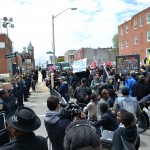Torching the City of Charm
Posted on April 29, 2015 by Robert Ringer
As the dependably vile Al Sharpton, criminal par excellence, arrives in Baltimore to stir the still-burning embers scattered about town, it’s time to reflect on the City of Charm.
Baltimore is perhaps the most authentic big-city blue-collar town in America, but it’s also a sophisticated and historic city. It’s where, in 1814, Francis Scott Key penned the lyrics to what was to become America’s national anthem, “The Star-Spangled Banner,” in a poem titled “The Defence of Fort McHenry.” True, it can’t compare to the jungle beat of rap-crap, but, still in all, it’s had a pretty good run and is still well enough thought of to be performed at most sporting events.
I mean, what can you say bad about a city that produced Babe Ruth, who grew up just down the street from Oriole Park at Camden Yards? And it wasn’t just the most famous Yankee of them all who transitioned from Baltimore to New York. One of the best-kept secrets in baseball is that the Yankee franchise itself was originally the Baltimore Orioles.
The Orioles moved to New York in 1903 and changed their name to the New York Highlanders, then changed it again in 1913 when they became the New York Yankees. Who would have guessed at the Yankee dominance that lay ahead?
And speaking of best-kept secrets in sports, most young folks don’t realize that the Johnny Unitis-led Baltimore Colts were America’s Team before the Dallas Cowboys were even born. In fact, yet another best-kept secret is that the Baltimore Colts were originally the Dallas Colts.
Dallas, okay, but there’s something that doesn’t ring true about trying to picture Colts legends like Lenny Moore, Gino Marchetti, Jim Parker, Raymond Berry, and Alan Ameche playing in Indianapolis.
Baltimore is also a mecca for those who appreciate the finer things in life. It showcases the beautiful and vibrant Inner Harbor, fine dining, world-renowned Johns Hopkins Hospital and Medical Complex, fine art galleries, and rustic old mansions that are architectural masterpieces, to touch on just a few of the more impressive aspects of the city. Real Baltimorians — not the crazed criminals who terrorize their own neighborhoods — have good reason to be proud of their city.
So what is it with these rioters? The truth is that rioters riot for one reason and one reason only: They enjoy engaging in criminal activity as a way of venting their pent-up anger rather than putting forth the effort to better their lives. All other reasons for destroying property and maiming or killing other human beings are bogus — period.
Whether it’s an outrageous, bold-faced lie like “Hands up, don’t shoot!” or the assassination of Martin Luther King Jr., all excuses for engaging in criminal behavior are just that — excuses. There’s a reason they call them rioters: They simply love to riot. It’s their main purpose in life. Night and day, it’s riots on demand; you furnish the excuse and they’ll furnish the riot. And pretty much any old excuse will do.
This week’s criminal assault on the jewel of the Chesapeake reminded me of the riots of the late sixties, the most memorable one taking place in Los Angeles’s Watts district where thirty-four people died. It also reminded me of just how little has changed since then.
Especially the fact that the yawner cliché “racial grievances” is still being used as an overarching excuse for violence. (Note: Baltimore has a black mayor, a mostly black city council, and about 50 percent of its police force is black. Next subject.)
How well I remember the sixties — vulgarity was in vogue … war was in vogue … weed was in vogue … Marxism was in vogue … and, yes, riots were in vogue. Today, vulgarity is in vogue … war is in vogue … weed is in vogue … Marxism is in vogue … and, yes, riots are still in vogue.
To use a layman’s paraphrase of Charles Dicken’s first paragraph in A Tale of Two Cities: It was the best of times; it was the worst of times; it was, in fact, pretty much like any other time. Which is to say that crises come and go, but only one time in history is the world going to come to an end — and you won’t be around to remember its happening anyway.
But in the sixties, I was so focused on business and having a good time that I didn’t take important events of the day seriously. Of course, I was aware of some of the bigger happenings, like the assassinations of JFK, RFK, and MLK, the Cuban missile crisis, Marilyn Monroe’s mysterious death, the American invasion of the Beatles, U.S. astronauts landing on the moon, and Woodstock, to name but a few of the more memorable ones.
I also knew there was a war in Vietnam, but didn’t much care, because I had studied enough history to know that since time immemorial, old politicians have been sending kids off to war to kill or be killed. Nothing new there, so I just kept on having fun and making money. After all, none other than Muhammed Ali had argued, “I ain’t got no quarrel with them Viet Cong. No Viet Cong ever called me a nigger.” My sentiments exactly.
The point is that while technology has changed the way we live, the fundamentals of life haven’t changed one iota. Which is why I’m more convinced than ever that the only way to maintain control over your life is to take matters into your own hands and refrain from getting distracted by the never-ending repeat of history we witness year in and year out.
Harry Browne said it all in How I Found Freedom in an Unfree World. His abridged message: Don’t try to live in the world as you would like it to be; live in the world that you actually inhabit — the world as it really is and as it will continue to be, regardless of whether or not you or I like it.
The riots will go on and on, guaranteed — but while they do, make sure that your life goes on as well. Learning to view things in a relative light is a talent that is almost certain to add many quality years to your life. You might also try not watching television for a week. You’ll be amazed at how little you miss and how much better you feel about the only life over which you have complete control.










